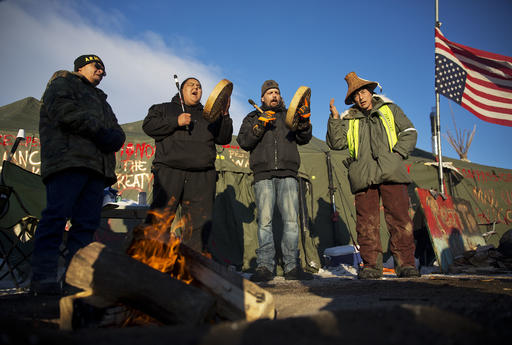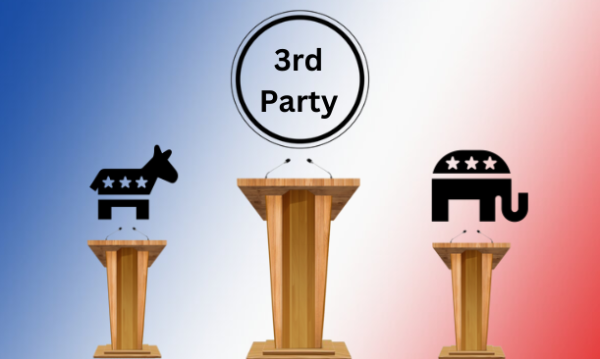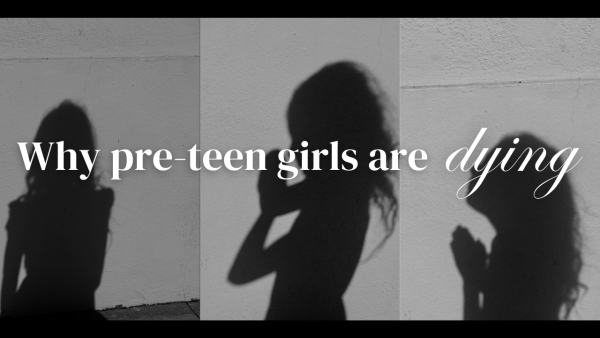Editorial: Standing Rock, the power of a protest

Native Americans from left, Eugene Sanchez, Jason Umtuch, Martan Mendenhall, and Hugh Ahnatook, all of Portland, Ore., drum and sing at the Oceti Sakowin camp where people have gathered to protest the Dakota Access oil pipeline in Cannon Ball, N.D., Sunday, Dec. 4, 2016. The U.S. Army Corps of Engineers said Sunday that it won’t grant an easement for the Dakota Access oil pipeline in southern North Dakota, handing a victory to the Standing Rock Sioux tribe and its supporters, who argued the project would threaten the tribe’s water source and cultural sites. (AP Photo/David Goldman)
In his Letter From a Birmingham Jail, Martin Luther King wrote from a jail cell, “One has a moral responsibility to disobey unjust laws.” He was imprisoned after being arrested for protesting against the unfair treatment of African Americans in Birmingham, Alabama. The statement, written in 1963, still applies and holds great significance for American citizens in 2016.
For months, Native Americans and allies have been protesting the construction of the Dakota Access Pipeline, which would transport crude oil from North Dakota. The pipeline would threaten the tribe’s lifestyle, land, and water supply. On December 4th, the US Army Corp of Engineers announced their decision supported by President Barack Obama to halt construction on the pipeline.
The victory for protestors is a widespread victory for the concept of protesting. While protests are often held with a negative connotation of violence and destruction, protesting in actuality is simply standing up against unjust situations, which is not only necessary to bring change, but also a moral duty of citizens.
The aftermath of the presidential election has divided the nation in an unusual way: those who believe in accepting the situation given to them, and those who believe in continuing to push for change. Standing Rock demonstrates the latter. There are circumstances in which accepting the results is necessary. However, there are a countless number of times in history where people didn’t accept the treatment given to them, because it was unjust. Movements such as abolition, women’s rights, civil rights, and others consisted of people instituting marches, boycotts, and more in an effort to initiate change.
Rights for African Americans were a result of the dedicated work by people such as Martin Luther King Jr., Rosa Parks, Harriet Tubman, Sojourner Truth, W.E.B. Du Bois, and other civil rights activists. Women would not have the ability to vote or work if it wasn’t for Elizabeth Cady Stanton, Susan B. Anthony, Carrie Chapman Catt, Lucretia Mott, Alice Paul, and others who advocated for women’s suffrage and equal rights. Fair work hours and pay occurred due to those involved in labor unions. In the past, change has happened when people refused to sit idly by when dealt injustice.
The victory for Standing Rock is not the end; there’s still much more to do to keep the water and the tribe safe. The protesters are aware of this, and they are staying put at Standing Rock to continue fighting for their rights. With room left for progress at Standing Rock and in the world, the change can only happen through advocates’ peaceful, yet relentless, fighting for justice in unjust situations. The mindset of accepting all circumstances, even ones that are harmful, and moving past them is dangerous and shouldn’t be overlooked. The importance of fighting for equality is one that can only be effectively demonstrated through standing up for what is fair and right. Silence and apathy is equivalent to injustice.












Angela Williams • Dec 27, 2016 at 5:36 pm
Well written.
Hugh Ahnatook • Dec 26, 2016 at 1:58 pm
My last name is “Ahnatook ” doesn’t have a “C”
Great story!! Keep up the good work!
Hugh